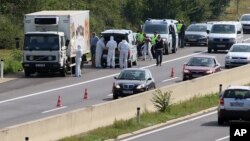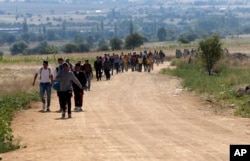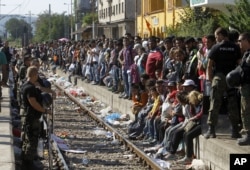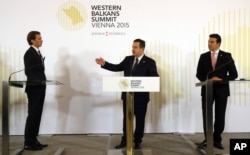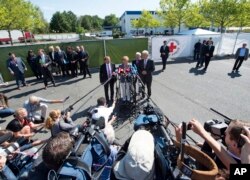As many as 50 refugees were found dead inside a truck in Austria Thursday as western Balkan leaders met in Vienna to discuss ways to stem Europe's migrant crisis.
An Austrian official confirmed that a truck had been found on a highway near the town of Parndorf, but he was unable to give an exact number of people found inside the truck. The victims reportedly suffocated.
The migrant crisis summit, attended by German Chancellor Angela Merkel, is being held to discuss Europe's worst migration crisis since World War II.
The "horrible" discovery ... is a warning to Europe to come to grips with the migrant crisis, Merkel said. "This is a warning to work to resolve this problem and show solidarity."
Transit countries struggle
Serbia and Macedonia have become major transit countries for tens of thousands of migrants trying to reach the European Union in recent months.
Ivica Dacic, Serbia's foreign minister, told the leaders that as a transit country, Serbia is expected to come up with an action plan, but "I think the European Union has to come up with a plan first. ... Please understand, we are bearing the brunt of the problem."
His comments were echoed by Macedonia Foreign Minister Nikola Poposki.
Last week Macedonia, which is dealing with 3,000 migrants arriving every day from EU member Greece, declared a state of emergency.
"We are not going to do the job with the 90,000 euros ($101,525) that we have received so far and we are probably not going to reach the objective with the 1 million euros that have been announced," Poposki said.
Need EU answer
"Unless we have a European answer to this issue, none of us should be under any illusion that this will be solved," he added.
EU members Greece and Italy, and non-EU Balkan countries such as Macedonia and Serbia are dealing with much of the initial refugee burden, through sea and land routes.
But many of these migrants are only in transit to western European countries, among them Germany and Austria.
Austrian plan
Austrian Foreign Minister Sebastian Kurz on Thursday floated elements of a five-point plan that foresees establishing safe havens in the region where those seeking asylum in the EU could be processed and – if they qualify – be given safe passage to Europe.
Kurz spoke on the sidelines of the conference that is primarily focused on ways of getting a grip on the migrant influx that threatens to overwhelm some countries while leaving others relatively unaffected.
Beyond safe havens, to be protected by troops acting under a U.N. mandate, the Austrian plan to be submitted to EU decision-makers foresees increased controls on Europe's borders and action against human smuggling.
The plan also calls for refugee quotas for each of the EU's 28 members – something opposed by many countries up to now.
Merkel and German Foreign Minister Frank-Walter Steinmeier are attending the meeting. Germany believes it could receive as many as 750,000 migrants this year, and much smaller Austria estimates corresponding per capita figures.
Jeered
The meeting in Vienna occurs a day after Merkel faced down jeering anti-immigrant protesters in the eastern German city of Heidenau, saying her country has no tolerance for "shameful and repulsive" treatment of refugees.
The Heidenau refugee center Merkel visited was the scene last week of neo-Nazi demonstrations. During Merkel's visit Wednesday, several dozen people gathered outside the center, booing and shouting, "Traitor, traitor!"
U.S. President Barack Obama spoke by phone Wednesday with Merkel to express his appreciation of her leadership in working to address the migration crisis in Europe, in particular her recent decision to ease the burden on border countries by providing haven to Syrian refugees, the White House said.
The U.N. refugee agency is calling on all governments to respond compassionately to the human tide of people who have been displaced from their homelands and are now seeking safety.
EU Enlargement Commissioner Johannes Hahn suggested resistance against quotas for EU countries is falling.
"We're going to have a quota settlement approach, and in light of recent developments, I believe all 28 member states are now ready to accept and approve that,'' Hahn said, without giving details.
He suggested the influx could get worse.
"There are 20 million refugees waiting at the doorstep of Europe," he said. "Ten to 12 million in Syria, 5 million Palestinians, 2 million Ukrainians, and about 1 million in southern Caucasia."
"Never before in history have so many people fled their homes to escape war, violence and persecution," Hahn said. "And given the large number of unresolved conflicts in our neighborhood, the stream of refugees seeking protection in Europe will not abate in the foreseeable future, I am afraid."
More than 250,000 migrants have crossed the Mediterranean to Europe this year according to the International Organization for Migration.
Nearly 2,400 people have died making the journey, often in rickety, overcrowded boats.
On Wednesday, Italy's coast guard reported that about 50 bodies were found Wednesday in the hull of a migrant boat rescued off the coast of Libya even as 439 were rescued.
Aru Pande contributed to this report from the White House.Some material for this report came from AP, AFP and Reuters.




